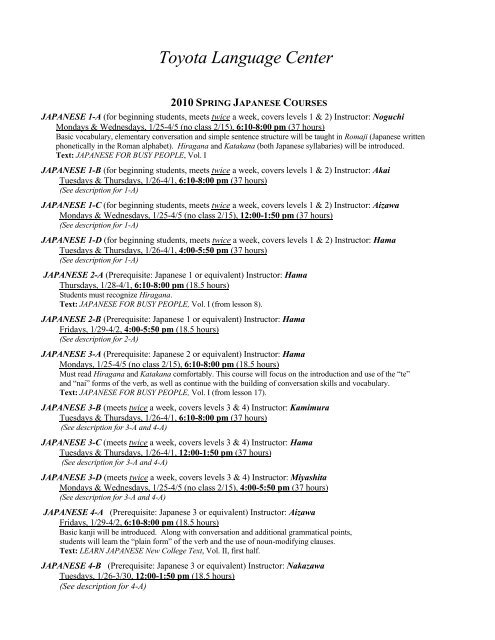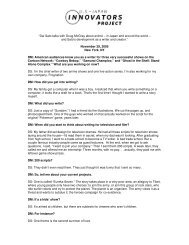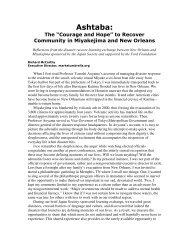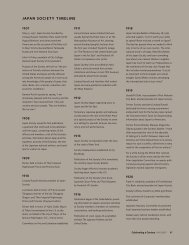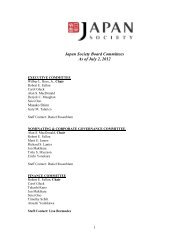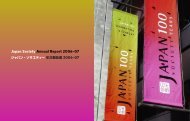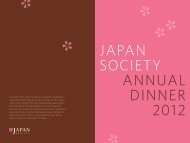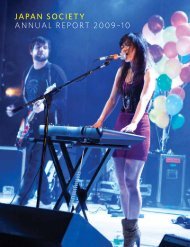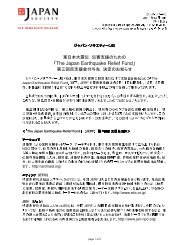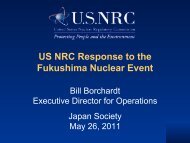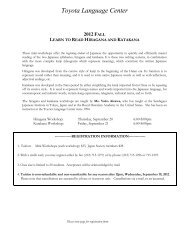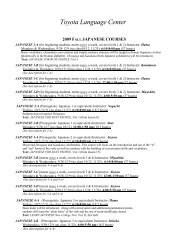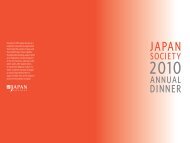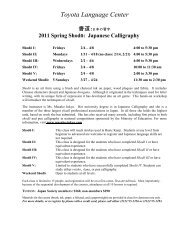Course Descriptions (PDF) - Japan Society
Course Descriptions (PDF) - Japan Society
Course Descriptions (PDF) - Japan Society
Create successful ePaper yourself
Turn your PDF publications into a flip-book with our unique Google optimized e-Paper software.
Toyota Language Center<br />
2010 SPRING JAPANESE COURSES<br />
JAPANESE 1-A (for beginning students, meets twice a week, covers levels 1 & 2) Instructor: Noguchi<br />
Mondays & Wednesdays, 1/25-4/5 (no class 2/15), 6:10-8:00 pm (37 hours)<br />
Basic vocabulary, elementary conversation and simple sentence structure will be taught in Romaji (<strong>Japan</strong>ese written<br />
phonetically in the Roman alphabet). Hiragana and Katakana (both <strong>Japan</strong>ese syllabaries) will be introduced.<br />
Text: JAPANESE FOR BUSY PEOPLE, Vol. I<br />
JAPANESE 1-B (for beginning students, meets twice a week, covers levels 1 & 2) Instructor: Akai<br />
Tuesdays & Thursdays, 1/26-4/1, 6:10-8:00 pm (37 hours)<br />
(See description for 1-A)<br />
JAPANESE 1-C (for beginning students, meets twice a week, covers levels 1 & 2) Instructor: Aizawa<br />
Mondays & Wednesdays, 1/25-4/5 (no class 2/15), 12:00-1:50 pm (37 hours)<br />
(See description for 1-A)<br />
JAPANESE 1-D (for beginning students, meets twice a week, covers levels 1 & 2) Instructor: Hama<br />
Tuesdays & Thursdays, 1/26-4/1, 4:00-5:50 pm (37 hours)<br />
(See description for 1-A)<br />
JAPANESE 2-A (Prerequisite: <strong>Japan</strong>ese 1 or equivalent) Instructor: Hama<br />
Thursdays, 1/28-4/1, 6:10-8:00 pm (18.5 hours)<br />
Students must recognize Hiragana.<br />
Text: JAPANESE FOR BUSY PEOPLE, Vol. I (from lesson 8).<br />
JAPANESE 2-B (Prerequisite: <strong>Japan</strong>ese 1 or equivalent) Instructor: Hama<br />
Fridays, 1/29-4/2, 4:00-5:50 pm (18.5 hours)<br />
(See description for 2-A)<br />
JAPANESE 3-A (Prerequisite: <strong>Japan</strong>ese 2 or equivalent) Instructor: Hama<br />
Mondays, 1/25-4/5 (no class 2/15), 6:10-8:00 pm (18.5 hours)<br />
Must read Hiragana and Katakana comfortably. This course will focus on the introduction and use of the “te”<br />
and “nai” forms of the verb, as well as continue with the building of conversation skills and vocabulary.<br />
Text: JAPANESE FOR BUSY PEOPLE, Vol. I (from lesson 17).<br />
JAPANESE 3-B (meets twice a week, covers levels 3 & 4) Instructor: Kamimura<br />
Tuesdays & Thursdays, 1/26-4/1, 6:10-8:00 pm (37 hours)<br />
(See description for 3-A and 4-A)<br />
JAPANESE 3-C (meets twice a week, covers levels 3 & 4) Instructor: Hama<br />
Tuesdays & Thursdays, 1/26-4/1, 12:00-1:50 pm (37 hours)<br />
(See description for 3-A and 4-A)<br />
JAPANESE 3-D (meets twice a week, covers levels 3 & 4) Instructor: Miyashita<br />
Mondays & Wednesdays, 1/25-4/5 (no class 2/15), 4:00-5:50 pm (37 hours)<br />
(See description for 3-A and 4-A)<br />
JAPANESE 4-A (Prerequisite: <strong>Japan</strong>ese 3 or equivalent) Instructor: Aizawa<br />
Fridays, 1/29-4/2, 6:10-8:00 pm (18.5 hours)<br />
Basic kanji will be introduced. Along with conversation and additional grammatical points,<br />
students will learn the “plain form” of the verb and the use of noun-modifying clauses.<br />
Text: LEARN JAPANESE New College Text, Vol. II, first half.<br />
JAPANESE 4-B (Prerequisite: <strong>Japan</strong>ese 3 or equivalent) Instructor: Nakazawa<br />
Tuesdays, 1/26-3/30, 12:00-1:50 pm (18.5 hours)<br />
(See description for 4-A)
JAPANESE 5-A (Prerequisite: <strong>Japan</strong>ese 4 or equivalent) Instructor: Hama<br />
Fridays, 1/29-4/2, 6:10-8:00 pm (18.5 hours)<br />
Among other things, students will learn comparative and conditional expressions.<br />
Text: LEARN JAPANESE New College Text, Vol. II, second half.<br />
JAPANESE 5-B (meets twice a week, covers levels 5 & 6) Instructor: Miyashita<br />
Mondays & Wednesdays, 1/25-4/5 (no class 2/15), 6:10-8:00 pm (37 hours)<br />
(See description for 5-A and 6-A)<br />
JAPANESE 5-C (Prerequisite: <strong>Japan</strong>ese 4 or equivalent) Instructor: Akai<br />
Mondays, 1/25-4/5 (no class 2/15), 12:00-1:50pm (18.5 hours)<br />
(See description for 5-A)<br />
JAPANESE 5-D (meets twice a week, covers levels 5 & 6) Instructor: Aizawa<br />
Tuesdays & Thursdays, 1/26-4/1, 4:00-5:50 pm (37 hours)<br />
(See description for 5-A and 6-A)<br />
JAPANESE 6-A (Prerequisite: <strong>Japan</strong>ese 5 or equivalent) Instructor: Akai<br />
Wednesdays, 1/27-3/31, 6:10-8:00 pm (18.5 hours)<br />
Students will learn how to use various modifying clauses to create complex sentences. Recognition of 100 kanji is expected.<br />
Text: LEARN JAPANESE New College Text, Vol. III, first half.<br />
JAPANESE 6-B (Prerequisite: <strong>Japan</strong>ese 5 or equivalent) Instructor: Aizawa<br />
Mondays, 1/25-4/5 (no class 2/15), 4:00-5:50 pm (18.5 hours)<br />
(See description for 6-A)<br />
JAPANESE 7-A (Prerequisite: <strong>Japan</strong>ese 6 or equivalent) Instructor: Akai<br />
Fridays, 1/29-4/2, 6:10-8:00 pm (18.5 hours)<br />
Students will develop various interactive communication skills, including the use of basic honorific expressions.<br />
Text: LEARN JAPANESE New College Text, Vol. III, second half.<br />
JAPANESE 7-B (meets twice a week, covers levels 7 & 8) Instructor: Miyashita<br />
Mondays & Thursdays, 1/25-4/5 (no class 2/15), 12:00-1:50pm (37 hours)<br />
(See descriptions for 7-A and 8-A)<br />
JAPANESE 7-C (Prerequisite: <strong>Japan</strong>ese 6 or equivalent) Instructor: Aizawa<br />
Wednesdays, 1/27-3/31, 4:00-5:50 pm (18.5 hours)<br />
(See descriptions for 7-A)<br />
JAPANESE 8-A (Prerequisite: <strong>Japan</strong>ese 7 or equivalent) Instructor: Aizawa<br />
Mondays, 1/25-4/5 (no class 2/15), 6:10-8:00 pm (18.5 hours)<br />
Grammatical points, such as potential, passive, and the use of honorific expressions, will be the focus of this course.<br />
Recognition of 200 kanji is expected.<br />
Text: LEARN JAPANESE New College Text, Vol. IV, first half.<br />
JAPANESE 8-B (Prerequisite: <strong>Japan</strong>ese 7 or equivalent) Instructor: Aizawa<br />
Fridays, 1/29-4/2, 12:00-1:50 pm (18.5 hours)<br />
(See descriptions for 8-A)<br />
JAPANESE 9-A (Prerequisite: <strong>Japan</strong>ese 8 or equivalent) Instructor: Aizawa<br />
Tuesdays, 1/26-3/30, 6:10-8:00 pm (18.5 hours)<br />
Students will continue to learn essential grammatical patterns, including causative expressions, to help achieve effective<br />
communication skills. Recognition of 250 kanji is expected. Enrollment in Kanji I course is recommended.<br />
Text: LEARN JAPANESE New College Text, Vol. IV, second half.<br />
JAPANESE 9-B (Prerequisite: <strong>Japan</strong>ese 8 or equivalent) Instructor: Aizawa<br />
Fridays, 1/29-4/2, 4:00-5:50 pm (18.5 hours)<br />
(See descriptions for 9-A)<br />
PLEASE NOTE: Classes higher on next page are designed to be taken repeatedly.<br />
New students - please come to the <strong>Japan</strong> <strong>Society</strong> before you register and look at the course material for<br />
various courses to decide which course to take.<br />
Continuing students and former students - please ask your teacher for advice as to which course you should<br />
take next. You are also encouraged to look at the course material for any course you are considering.
INTERMEDIATE SPEAKING & LISTENING A (Prerequisite: <strong>Japan</strong>ese 9 or equivalent) Instructor: Miyashita<br />
Fridays, 1/29-4/2, 6:10-8:00 pm (18.5 hours)<br />
Designed for those who have mastered basic grammar and sentence patterns. Development of speaking and listening<br />
skills will be the focal point of classes at the Intermediate Level. Enrollment in the Kanji I course is recommended.<br />
INTERMEDIATE SPEAKING & LISTENING B (Prerequisite: <strong>Japan</strong>ese 9 or equivalent) Instructor: Miyashita<br />
Wednesdays, 1/27-3/31, 12:00-1:50pm (18.5 hours)<br />
(See description for Intermediate Speaking & Listening A)<br />
JAPANESE IN ANIME A (Prerequisite: <strong>Japan</strong>ese 9 or equivalent) Instructor: Noguchi<br />
Fridays, 1/29-4/2, 6:10-8:00 pm (18.5 hours)<br />
This new class is at the same level as Intermediate Speaking and Listening. Anime and manga will be used as windows<br />
into the culture of <strong>Japan</strong>. The first half of the class will be spent studying some works. The second half will be discussion<br />
and conversation practice using the expressions learned in the first half.<br />
JAPANESE 10-A (Prerequisite: Int. Speaking & Listening or equivalent) Instructor: Aizawa<br />
Wednesdays, 1/27-3/31, 6:10-8:00 pm (18.5 hours)<br />
Reading materials include short newspaper articles and stories. Listening comprehension is improved by the use of television<br />
programs and audio tapes. Speaking is emphasized through discussion, role-playing, and short, informal speeches.<br />
Writing is also encouraged. Recognition of 350 kanji is expected. Enrollment in Kanji courses is recommended.<br />
JAPANESE 10-B (Prerequisite: Int. Speaking & Listening or equivalent) Instructor: Hama<br />
Fridays, 1/29-4/2, 12:00-1:50 pm (18.5 hours)<br />
(See description for 10-A)<br />
JAPANESE 11-A (Prerequisite: <strong>Japan</strong>ese 10 or equivalent) Instructor: Hama<br />
Tuesdays, 1/26-3/30, 6:10-8:00 pm (18.5 hours)<br />
Television programs, short stories and current events from <strong>Japan</strong>ese newspapers and magazines will be discussed.<br />
Students will be asked to express their opinions on wide ranging subjects. Recognition of 500 kanji is expected.<br />
Enrollment in Kanji courses is highly recommended.<br />
JAPANESE 12-A (Prerequisite: At least five years background in <strong>Japan</strong>ese) Instructor: Aizawa<br />
Thursdays, 1/28-4/1, 6:10-8:00 pm (18.5 hours)<br />
Current events from <strong>Japan</strong>ese newspapers and magazines, as well as novels, TV news and movies, will be used to help build<br />
up useful expressions and idioms. Discussion and short speeches will be encouraged to promote oral communication.<br />
Students should be able to recognize at least 800 kanji. Enrollment in Kanji courses is highly recommended.<br />
KANJI I (Prerequisite: <strong>Japan</strong>ese 8 or higher) Instructor: Hama<br />
Wednesdays, 1/27-3/31, 6:10-8:00 pm (18.5 hours)<br />
This course is for students who want to master the essential kanji taught in <strong>Japan</strong>’s elementary schools. Students are<br />
expected to learn the “300-level” kanji, the focus of study being on the understanding of the basic radical systems.<br />
The class is conducted almost entirely in <strong>Japan</strong>ese. Text: Basic Kanji Book I.<br />
KANJI II (Prerequisite: <strong>Japan</strong>ese 9 or Kanji I) Instructor: Miyashita<br />
Thursdays, 1/28-4/1, 6:10-8:00 pm (18.5 hours)<br />
This course is for students who have already mastered approximately 300 kanji. Students are expected to learn the “600<br />
level” kanji, which are introduced by the first year of <strong>Japan</strong>ese junior high school. The class is conducted in <strong>Japan</strong>ese.<br />
Text: Basic Kanji Book II.<br />
KANJI III (Prerequisite: <strong>Japan</strong>ese 11 or Kanji II) Instructor: Inkyo<br />
Mondays, 1/25-4/5 (no class 2/15), 6:10-8:00 pm (18.5 hours)<br />
Students are expected to master the “1,500-level” kanji necessary to read <strong>Japan</strong>ese newspapers, focusing on the key kanji<br />
introduced mainly in the second and third years of <strong>Japan</strong>ese junior high school. The class is conducted in <strong>Japan</strong>ese.<br />
Text: Intermediate Kanji Book I 漢 字 1000 Plus.<br />
経 済 ・ビジネス: Advanced Reading & Speaking I (Prerequisite: Level 12 or higher) Instructor: Miyashita<br />
Tuesdays, 1/26-3/30, 6:10-8:00 pm (18.5 hours)<br />
This special class is for advanced students who have an interest in <strong>Japan</strong>ese business, economics, and society. This class<br />
will also cover the cultural aspects of business. Students will read and discuss the latest articles from the Nihon Keizai<br />
Shimbun (Nikkei), Newsweek and Forbes (<strong>Japan</strong>ese editions). In addition, NHK business news and drama videos will<br />
be used. Students should be familiar with the “1,200-level” kanji.
REGISTRATION<br />
Important note: We strongly recommend that you register early to ensure enrollment in your first choice of class.<br />
1. Registration deadline: 12 pm, Friday, January 22, 2010. Acceptance will be acknowledged by phone or letter.<br />
2. Tuition: <strong>Japan</strong> <strong>Society</strong> members: $230* (18.5 hours of instruction) $400* (37 hours of instruction)<br />
Non-members: $260 (18.5 hours of instruction) $450 (37 hours of instruction)<br />
3. Tuition is non-refundable and non-transferable for any reason after 12 pm, Friday, January 22, 2010.<br />
Refunds are subject to a $20 service charge. No partial registration or auditing is permitted.<br />
Please note that cancellations are accepted by phone or in person only. Cancellations via e-mail are not accepted.<br />
4. The <strong>Society</strong> reserves the right to cancel any course if sufficient enrollment is not obtained.<br />
In such cases, those students already enrolled will receive full refunds.<br />
5. Textbooks are available at the <strong>Japan</strong> <strong>Society</strong> and are offered to students at special prices. (Price includes NY State Sales Tax)<br />
JAPANESE FOR BUSY PEOPLE, Vol. I (Revised 3 r d Edition; Romanized) published by Kodansha International $25.00<br />
LEARN JAPANESE New College Text, Vol. II published by University of Hawaii $18.00<br />
LEARN JAPANESE New College Text, Vol. III published by University of Hawaii $19.00<br />
LEARN JAPANESE New College Text, Vol. IV published by University of Hawaii $20.00<br />
BASIC KANJI BOOK I published by Bonjinsha $35.00<br />
BASIC KANJI BOOK II published by Bonjinsha $38.00<br />
INTERMEDIATE KANJI BOOK I 漢 字 1000 Plus. published by Bonjinsha $40.00<br />
6. New students of the Toyota Language Center: Students with no previous background in <strong>Japan</strong>ese should enroll in a<br />
Level 1 course. Students with some background should refer to the course textbooks to determine the most appropriate<br />
class for your needs. These textbooks are available for review and purchase at the Toyota Language Center. There is no<br />
placement exam.<br />
7. For more information or to register, please call (212) 715-1256 or (212) 715-1293, or fax (212) 715-1279.<br />
Instructors: All of the <strong>Society</strong>'s instructors are native <strong>Japan</strong>ese with extensive experience.<br />
Ms. Yuko Aizawa has taught at the Sendagaya <strong>Japan</strong>ese Institute in Tokyo, <strong>Japan</strong> and at the Royal Hawaiian<br />
Academy in the United States. She has been an instructor at the Toyota Language Center since 1994.<br />
Ms. Reiko Akai has a Bachelor’s Degree in Linguistics, and has worked in the private sector in <strong>Japan</strong>. She has<br />
taught <strong>Japan</strong>ese in <strong>Japan</strong>, and has been a private tutor of <strong>Japan</strong>ese in the United States for five years.<br />
Ms. Keiko Hama has taught <strong>Japan</strong>ese in Germany and the US for over ten years. She received her Master’s<br />
Degree in <strong>Japan</strong>ese Sociology and Linguistics at the University of Heidelberg. Since then, she has been an<br />
interpreter, translator and <strong>Japan</strong>ese teacher in the private and public sectors.<br />
Ms. Masako Inkyo has a university degree is in <strong>Japan</strong>ese Calligraphy and a license to teach literature in<br />
Middle and High School. She is a member of the three largest shodō professional associations in <strong>Japan</strong>. She<br />
has received many awards, including first prizes in both shodō and pen calligraphy and kanji in national<br />
competitions sponsored by the Ministry of Education.<br />
Ms. Tomoyo Kamimura holds Bachelor’s degree from Waseda University, MA in Linguistics from the<br />
University of Oregon and an MBA from Columbia University. She has been teaching <strong>Japan</strong>ese at colleges and<br />
universities both in the US and <strong>Japan</strong> for over ten years. Currently she serves as Fulltime Faculty member at<br />
The New School's Foreign Language Department.<br />
Ms. Mami Miyashita earned a <strong>Japan</strong>ese Teaching License in <strong>Japan</strong>, a certificate of Teaching <strong>Japan</strong>ese as a<br />
Foreign Language from Ohio State University and a Master’s Degree from West Chester University. She has<br />
been involved with foreign language education for more than nineteen years, most recently at the University of<br />
Delaware from 1999 to 2005.<br />
Ms. Kazuko Nakazawa has a Bachelor of Arts in <strong>Japan</strong>ese Literature. She has taught <strong>Japan</strong>ese privately and<br />
in an after-school program in <strong>Japan</strong> for three years, and privately in the United States for two years.<br />
Ms. Hiromi Noguchi has a Master’s Degree in Teaching a Foreign Language, <strong>Japan</strong>ese, from the Monterey<br />
Institute of International Studies in California, and is seeking a Doctor’s degree in Applied Linguistics from<br />
the Teacher’s College, Columbia University. She has taught <strong>Japan</strong>ese at Columbia and at the Monterey<br />
Institute of International Studies.


